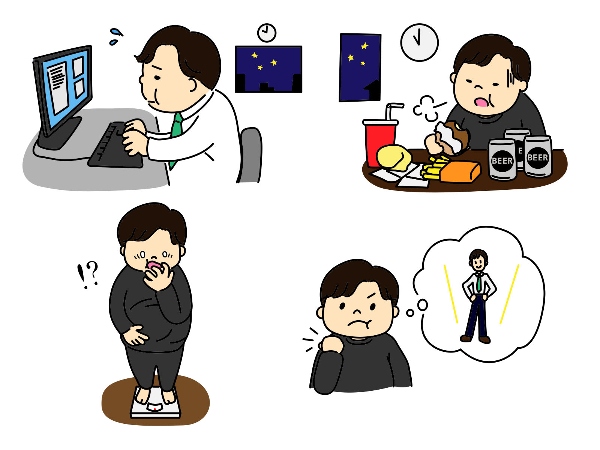Topics
12/18/2022
The Atkins Diet: What Were the Long-Term Effects of Weight Loss?
-
Contents
-
- What is the Atkins diet?
- Comparative study of various diets in weight loss
- What were the long-term results of the Atkins diet?
- Why was obesity rare among rice-eating Asians?
- Is the Atkins also ineffective for weight loss?
<The bottom line>
1. What is the Atkins diet?
The Atkins diet is a type of low-carbohydrate diet proposed by cardiologist Robert Atkins that restricts the amount of carbohydrates for energy and instead uses "fat" as an energy source. It is characterized by limiting carbohydrates to twenty to twenty-five grams per day for the first two weeks and then gradually increasing.
According to Dr. Fung, the author of “The Obesity Code,” Dr. Atkins weighed nearly one-hundred kilograms in 1963, and when he began working as a cardiologist in New York City, he needed to lose weight.
However, he couldn’t lose weight successfully on a conventional calorie-restricted diet, so he tried the low-carb diet based on the medical literature, which worked well as advertised, and he recommended it to his patients.

In 1972, he published "Dr. Atkins' Diet Revolution," which quickly became a bestseller.
At the time, it was said that the American Medical Association still considered high fat in the diet to be a cause of heart disease and stroke, and the "low-carb diet," which allowed people to eat as much meat and fat as they wanted, was not accepted.
Despite this, the low-carb diet’s popularity, rekindled in the 1990’s, led to a trend in the Atkins diet. In 2004, twenty-six million Americans said they were on some kind of low-carb diet .
New studies started appearing around 2005, comparing the Atkins diet to other diets that were once considered the standard, and what were the results[1]?
Let's take a look. I would like to express my thoughts on this at the end of this article.
2. Comparative study of various diets in weight loss
"In 2007, the Journal of the American Medical Association published a more detailed study: Four different popular weight plans were compared in a head-to-head trial.
One clear winner emerged-the Atkins diet. The other three diets (Ornish, which has very low fat; the Zone, which balances protein, carbohydrates and fat in a 30:40:20 ratio; and a standard low-fat diet) were fairly similar with regard to weight loss.

However, in comparing the Atkins to the Ornish, it became clear that not only was weight loss better, but so was the entire metabolic profile. Blood pressure, cholesterol and blood sugars all improved to a greater extent on Dr. Atkins's diet.
In 2008, the DIRECT (Dietary Intervention Randomized Controlled Trial) study reaffirmed once again the superior short-term weight reduction of the Atkins diet. Done in Israel, it compared the Mediterranean, the low-fat and the Atkins diets.
While the Mediterranean diet held its own against the powerful, fat-reducing Atkins diet, the low-fat AHA standard was left choking in the dust–sad, tired and unloved, except by academic physicians."
(Jason Fung. The Obesity Code. Greystone Books, 2016, Pages 100-3.)
3. What were the long-term results of the Atkins diet?
"Longer-term studies of the Atkins diet failed to confirm the much hoped-for benefits.
Dr. Gary Foster from Temple University published two-year results showing that both the low-fat and the Atkins groups had lost but then regained weight at virtually the same rate. (*snip*)
A systematic review of all the dietary trials showed that much of the benefits of a low-carbohydrate approach evaporated after one year.

Greater compliance was supposed to be one of the main benefits of the Atkins approach, since there was no need for calorie counting.
However, following the severe food restrictions of Atkins proved no easier for dieters than conventional calorie counting.
Compliance was equally low in both groups, with upwards of 40 percent abandoning the diet within one year.
In hindsight, this outcome was somewhat predictable. The Atkins diet severely restricted highly indulgent foods such as cakes, cookies, ice cream and other desserts.
These foods are clearly fattening, no matter what diet you believe in. We continue to eat them simply because they are indulgent. (*snip*)The Atkins diet does not allow for this simple fact, and that doomed it to failure.
The first-hand experience of many people confirmed that the Atkins diet was not a lasting one. Millions of people abandoned the Atkins approach, and the New Diet Revolution faded into just another dietary fad. (The company Dr. Atkins founded in 1989 went bankrupt.)
But why? What happened?
One of the founding principles of the low-carbohydrate approach is that dietary carbohydrates increase blood sugars the most. High blood sugars lead to high insulin. High insulin is the key driver of obesity. Those facts seem reasonable enough. What was wrong?"
(Fung J. The Obesity Code. Pages 100-3.)
4. Why was obesity rare among rice-eating Asians?
Experts who advocate low-carbohydrate diets seem to think that carbohydrates cause weight gain because they eventually stimulate insulin secretion.
However, Dr. Fung mentioned that the carbohydrate-insulin hypothesis is incomplete. Various problems are cited, but he raised the "paradox of the Asian rice eater" and the "diet of Kitava Island, in Papua New Guinea" as notable examples.
Most Asians have been eating a diet based on refined rice as their staple food for at least the last five decades; a study conducted in the late 1990’s found that carbohydrate intake in China and Japan was similar to or rather, higher than in the U.K. and the U.S.

Nevertheless, until recently, obesity was not a significant problem in both countries.
Also, according to a study conducted by Dr. Staffan Lindeberg in 1989 on the diet of the Kitava islanders, even though they were getting sixty-nine percent of their calories from carbohydrates such as yams, sweet potatoes and cassava, etc., their insulin levels were low and few people were obese[2].
Since Dr. Fung just mentioned the paradox of the Asian rice eater, I would like to mention this.
I am Japanese and was born in 1970, and I think that I should know how our diet has changed in the last five decades, and as a result, how obesity has increased in our society.
(This is explained in more detail in the following blog.)
[Related article] Why Does the Body Perceive That It Is More Starved than in the Past?
In short, I believe that carbohydrates are a contributing cause, but not the quantity itself.
Japan was basically an agrarian society, and rice cultivation has always been important. Until at least 40-50 years ago, I believe most Japanese people had eaten a lot of rice as it is called the staple food, but at the same time, they also ate a lot of fibrous vegetable dishes using roots or stems of plants, fermented soybean product called “natto,” and fish and meat dishes. Rice cakes called “mochi” and Japanese sweets as well.
At least in my family, my father was strict about family members eating meals three times a day at a regular time, every day.
I think the recent increase in the obesity rate in Japan can be explained due to a combination of many factors, including easily digestible carbohydrates such as bread and noodles, unbalanced diets with few vegetables, eating out, instant foods, and irregular life rhythms such as skipping breakfast or late dinners.
What I have seen in my experience is that many young women who go on a diet and then come off, some of them further increase their maximum weight.

(Irregular lifestyle)
I believe that the "three factors plus one" of my intestinal starvation theory can explain how the various factors intertwine, and how weight gain occurs. It's not just the amount of carbs eaten that matter.
5. Is the Atkins also ineffective for weight loss?
The "Do calories make people fat, or carbs?" concept is said to be a debate that has been going on since the 1800’s[3], and I think both are true in some ways, but neither is perfect.
If you reduce the amount of any energy source beyond what your body needs, it’s obvious that you will lose weight in the short term. However, if you go back to your original diet, in the long run, you will also regain the weight you had lost, as various studies have confirmed, and as most people who have been on a diet have probably realized.
The reason for this is that the human body inherently has a homeostatic mechanism that drives it to return to its set point weight. So, the point is that in order to avoid rebounding, you must lower your set-point weight itself.
(For more details, please refer to the article below.)
[Related article] There Are Two Steps to Lose Weight the Right Way
In terms of this rebound in the Atkins diet in section three, I don't think it necessarily means that low-carb diets, including Atkins, are ineffective. I’m positive that it’s the one of the correct ways to lose weight.
However, if we focus too much on blood sugar and insulin levels, we lose sight of another important point.
What I mean is that the key to a low-carb diet, I believe, is not just reducing carbohydrate intake but also increasing foods that are less digestible and take longer to digest, such as fiber-rich foods, meat, fats, and dairy products.
When plenty of undigested food remains in the gastrointestinal tract, it helps to sustain a feeling of fullness and reduces hunger. In the long run, I think this approach can lower absorption rates. In particular, I believe fats and oils in the diet should not be reduced, but rather should be consumed regularly at every meal and even when having snacks.
Considering all of the above, I think that dieticians do not need to ban sweets such as chocolate, candy, ice cream, etc. so strictly. What’s most important is to make the diet sustainable without overburdening yourself, even allowing occasional indulgences in sweets.
The bottom line
(1) In the early 2000’s, the Atkins diet became a huge trend in the U.S., inspired by the low-carb diet that was rekindled in the 1990’s. In the short term, the Atkins method not only helped people lose weight, but it also significantly improved blood pressure, cholesterol, and blood glucose levels.
(2) However, in long-term studies, the subjects rebounded, as seen with low-fat diets. After one year from the end of the study, all the benefits of Atkins diets were gone.
Dr. Fung considered the "carbohydrate-insulin hypothesis" an incomplete theory. Carbohydrate intake itself was not the problem.
(3) My thoughts. If there is no change in your set-point for body weight, rebound can occur if you eat as you used to. In order to lose weight correctly, your set-point weight itself needs to be lowered.
(4) The key to a low-carb diet is not just controlling the amount of insulin released. It’s also important to reduce refined carbohydrates while increasing the intake of fiber-rich foods and those that take longer to digest.
When plenty of undigested food remains in the gastrointestinal tract, it helps sustain a feeling of fullness and alleviates hunger. Over time, I believe this approach can lead to a decrease in absorption rates.
<Reference>
[1] Jason Fung. The Obesity Code. Greystone Books, 2016, Pages 96-99.
[2] Jason Fung. The Obesity Code. Pages 103-105.
[3] Gary Taubes. Why We Get Fat. New York: Anchor Books, 2011, Pages 148-162.

